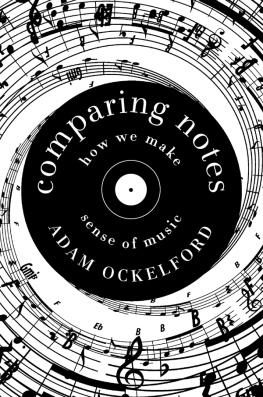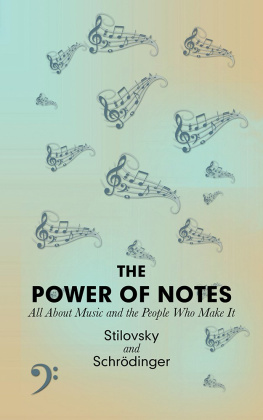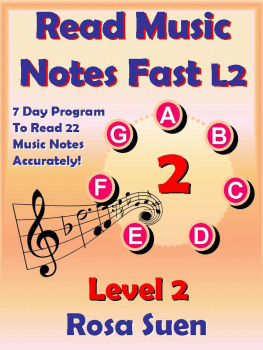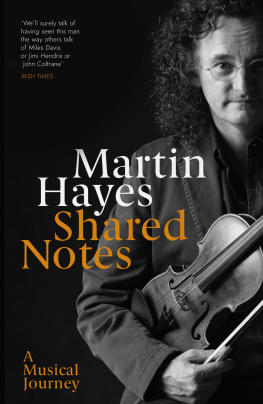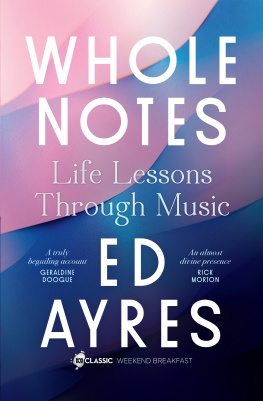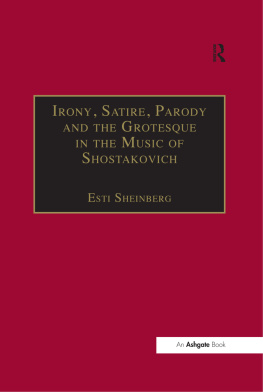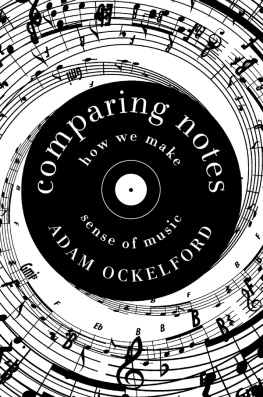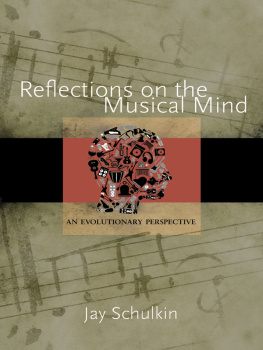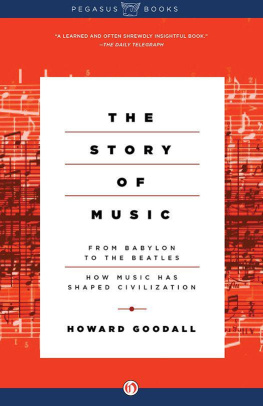Ockelford - Comparing Notes
Here you can read online Ockelford - Comparing Notes full text of the book (entire story) in english for free. Download pdf and epub, get meaning, cover and reviews about this ebook. City: New York, year: 2018, publisher: Pegasus Books, genre: Romance novel. Description of the work, (preface) as well as reviews are available. Best literature library LitArk.com created for fans of good reading and offers a wide selection of genres:
Romance novel
Science fiction
Adventure
Detective
Science
History
Home and family
Prose
Art
Politics
Computer
Non-fiction
Religion
Business
Children
Humor
Choose a favorite category and find really read worthwhile books. Enjoy immersion in the world of imagination, feel the emotions of the characters or learn something new for yourself, make an fascinating discovery.
- Book:Comparing Notes
- Author:
- Publisher:Pegasus Books
- Genre:
- Year:2018
- City:New York
- Rating:4 / 5
- Favourites:Add to favourites
- Your mark:
- 80
- 1
- 2
- 3
- 4
- 5
Comparing Notes: summary, description and annotation
We offer to read an annotation, description, summary or preface (depends on what the author of the book "Comparing Notes" wrote himself). If you haven't found the necessary information about the book — write in the comments, we will try to find it.
Comparing Notes — read online for free the complete book (whole text) full work
Below is the text of the book, divided by pages. System saving the place of the last page read, allows you to conveniently read the book "Comparing Notes" online for free, without having to search again every time where you left off. Put a bookmark, and you can go to the page where you finished reading at any time.
Font size:
Interval:
Bookmark:

ALSO BY ADAM OCKELFORD
In the Key of Genius: The Extraordinary Life of Derek Paravicini
Music, Language and Autism: Exceptional Strategies for Exceptional Minds
Applied Musicology: Using Zygonic Theory to Inform
Music Education, Therapy, and Psychology Research
Repetition in Music: Theoretical and Metatheoretical Perspectives
Music for Children and Young People with Complex Needs

COMPARING NOTES
Pegasus Books Ltd
148 West 37th Street, 13th Floor
New York, NY 10018
Copyright 2018 by Adam Ockelford
First Pegasus Books hardcover edition May 2018
All rights reserved. No part of this book may be reproduced in whole or in part without written permission from the publisher, except by reviewers who may quote brief excerpts in connection with a review in a newspaper, magazine, or electronic publication; nor may any part of this book be reproduced, stored in a retrieval system, or transmitted in any form or by any means electronic, mechanical, photocopying, recording, or other, without written permission from the publisher.
ISBN: 978-1-68177-744-3
ISBN: 978-1-68177-810-5 (e-book)
Distributed by W. W. Norton & Company, Inc.
Contents
For Sir Paul Ennals
Thanks to my agent, Andrew Lownie; Andrew Franklin, Louisa Dunnigan, Joe Staines, Valentina Zanca and Penny Daniel at Profile Books; my friends and colleagues, Desmond Sergeant, David Hargreaves, Graham Welch, Evangelos Himonides and Ian Cross; students, Angela Voyajolu, Michael Thorpe, Hayley Trower, Evangeline Cheng, Adam Reece and Annamaria Mazzeschi; photographer Robert Maidment-Evans for permission to use the image of Derek Paravicini and me in Figure 18; Rosie Chomet for drawing the images used in Figures 1922; the Wesleyan University Press for permission to cite the opening of Christopher Smalls book Musicking: The Meanings of Performing and Listening on p. 230; and most importantly, my forbearing family, Sue, Felicity, Eloise and Tom.
HOW DOES MUSIC WORK? How does it make sense and what does it mean?
Seeking answers to these seemingly innocuous questions has preoccupied me for the last three-and-a-half decades. The genesis of my search can be traced back to the time when I first began working as a volunteer at Linden Lodge, a residential special school in London, in the late 1970s. All the pupils were blind or partially sighted and an increasing number of those recently enrolled, I was informed, had a range of learning difficulties too (many of whom today would be described as being on the autism spectrum). Little wonder, then, before my first visit to Linden Lodge, that I was warned not to be surprised if the youngsters I encountered had delayed or aberrant language, and were unable to initiate or sustain a conversation, sometimes repeating words or phrases over and over again with no apparent meaning (exhibiting so-called echolalia). Dont assume that they will understand what you say, I was advised, and expect some to show more of an interest in the sensory qualities of everyday objects than their function: tapping bowls and drinking glasses to make them ring, for example, and repeatedly pressing the same button on speak and spell games, rather than trying to produce words.
Given accounts like these, my assumption before visiting the school had been that the main challenge in working with the pupils would be in reaching down to their modest levels of musical accomplishment from the rarefied heights of my life as a student at the Royal Academy of Music. I had recently performed Bachs celebrated Italian Concerto on the harpsichord and taken the lead role in Mozarts elegant Oboe Quartet, K. 370; I was in the midst of analysing Beethovens esoteric late Piano Sonata, Op. 110; and I was getting to grips with composing in the terse style of the first movement of Bartks 4th String Quartet. In the previous year I had won prizes for keyboard harmony, music theory, and for my contribution to a performance of an oboe trio by the recherch French Baroque composer, Joseph Bodin de Boismortier.
Confident in my knowledge and abilities, honed through countless hours of study and practice, I imagined that I would be able to engage the children in some relatively unsophisticated musical activities (maybe joining in with well-known songs, playing hand-held percussion instruments and the like). Then after a couple of years or so, I would tactfully move on, freeing up my evenings once more to pursue a career doing proper work as a professional musician.
But I was wrong. On both counts.
* * *
On my first evening at Linden Lodge, I was shown round by Paul Ennals, later to be knighted for services to children as Chief Executive of the National Childrens Bureau, but more significantly then the mobility officer at the school, whose job was to teach the pupils how to move around safely using a white cane. Paul also happened to be a competent amateur musician and my landladys son, and it was through this connection that he had cajoled me into coming along to meet these amazing kids with a gentle insistence that eventually eroded my increasingly tenuous excuses to be elsewhere. So, here I was, politely hiding my scepticism as he pushed open a door onto a rather dingy, narrow corridor that the fading autumnal light was barely able to penetrate. (I remember thinking that lighting probably wasnt a priority at the school.)
In the gloom I managed to make out three or four doors on the left. From the first there emanated the strains of what sounded like early twentieth-century piano music. Was it late Frank Bridge, I wondered? Or maybe even Scriabin. The series of complex chords high up on the keyboard continued. Whoever was playing them was doing so with great finesse. Paul had said that there were one or two good musicians on the staff at Linden Lodge, but even so I hadnt been expecting this level of sophistication.
There was a click as Paul opened the door, and the playing stopped abruptly. It was even darker in the practice room than in the corridor. Very odd, I thought. Without saying anything, Paul flicked on the light switch.
I was astonished to see not an adult, but the diminutive figure of a boy on the piano stool. He couldnt have been more than 10 or 11 years old. He didnt turn round to greet us, nor did he say anything. I was immediately struck by the fact that his eyes appeared to be roving randomly without fixing on anything. I knew that I would always remember this, my first encounter with a blind child. Curiously, he was shaking with what appeared to be silent laughter or excitement, or maybe both.
Pauls voice reached out to him, as though putting a reassuring hand on his shoulder.
Hi Anthony, its Paul. And heres Adam.
The boy didnt respond, but stood up and shuffled tentatively towards the window, and ended up, somewhat disconcertingly, facing away from us. He gave me the sense that by vacating the stool one of us was expected to take his place.
I wanted to say something, but, suddenly overcome with embarrassment, found myself bereft of speech. Paul must have sensed my discomfort and (as he always did) effortlessly picked up the thread of our conversation.
I told Anthony youre keen on twentieth-century composers, he said, managing to speak for the pair of us and to us both at the same time.
Right.
It suddenly dawned on me that Anthony must have been waiting for my arrival, and that the Bridge-cum-Scriabin was intended as a welcome to Linden Lodge. He still didnt say anything, but the shaking of his upper body grew more intense. I felt a prickling sense of expectation, but was tongue-tied once more.
Next pageFont size:
Interval:
Bookmark:
Similar books «Comparing Notes»
Look at similar books to Comparing Notes. We have selected literature similar in name and meaning in the hope of providing readers with more options to find new, interesting, not yet read works.
Discussion, reviews of the book Comparing Notes and just readers' own opinions. Leave your comments, write what you think about the work, its meaning or the main characters. Specify what exactly you liked and what you didn't like, and why you think so.

